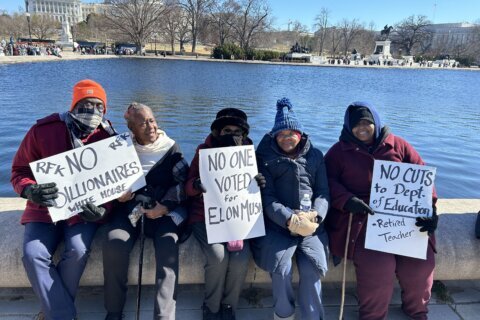President Donald Trump is reportedly planning to sign an executive order that would make major changes, including downsizing, at the Department of Education.
On the campaign trail, Trump vowed to close the agency, but a D.C.-area school official who reviewed a draft of the possible executive order said it would limit the size of the federal agency to the maximum extent allowed by the law.
In the midst of uncertainty about the agency’s future, school systems across the region are working on finalizing their budgets for next year. Some are taking a cautious approach, fearing federal funding could be in jeopardy, even though federal money represents a small portion of their overall budgets.
“(Trump has) learned that he can’t just freeze federal funding like he wants to,” said Prince William County School Board Chairman Babur Lateef, who’s also running for lieutenant governor in Virginia. “For example, the Supreme Court said you’re going to have to pay out those USAID contracts. I think in the same way, he’s just going to try to reduce the size of Department of Education, but its responsibilities will remain.”
Those responsibilities, Lateef said, include funding for Title I schools, which are those with high numbers of economically disadvantaged students. That money helps schools hire more teachers, buy more materials and “pay for programs that will elevate those students,” Lateef said.
The agency covers funding for special education kids too, and it’s responsible for dispersing federal funding for higher education. It oversees Stafford Loans and Pell Grants, he said.
Even if the department completely closes, Lateef said school divisions should still get that funding, because it’s allocated by Congress, not by the agency or executive authority.
“If you are a parent of a child, of a child with disabilities, or a child in a Title I school, you should know that Prince William County Schools will protect those programs and those students,” Lateef said. “No matter what the federal government does, we will have the funding. We will find the funding to make sure we do what we need to do.”
The Education Department also houses the Office for Civil Rights, which ensures school divisions are complying with federal discrimination laws. It’s unclear, Lateef said, whether that office would be moved under another government agency, such as the Justice Department, or if it may close entirely.
“They may just say it’s closed and we’re not going to do that work anymore, because we don’t believe there’s discrimination, and I would tell you that they’re wrong,” Lateef said.
Decisions that school boards make, Lateef said, supersede anything a president can order them to do, as long as the school district is complying with state and federal laws.
“The president’s office has the authority to make executive orders that would be enforceable across federal agencies,” Lateef said. “He cannot order school divisions to change the way we manage our school divisions.”
Teacher pipeline program cut
A teacher residency program run through Virginia Commonwealth University is among those impacted by Department of Education funding cuts that have already been made, Lateef said.
The federal government gives VCU about $10 million to run the residency training programs, Lateef said. Because the program was cut, the school division will replace the funding to keep the partnership running, “but not all other school divisions have those resources,” he said.
The program allows teachers to do undergraduate training in a local school system’s classroom, and then allows the school divisions to hire them right out of college. It also makes sure they’re mentored, so they don’t leave the field after a few years.
“It’s really been very helpful throughout this teacher shortage issue we have, because it’s just been hard to hire teachers,” Lateef said.
Meanwhile, in Prince William County, Lateef said division leaders have been reviewing the possible impact if federal funding were to be cut, and whether they’d have enough money stowed away to make up for it.
“We have reserves to make up for that, and that’s why I say no family of a child with disabilities or a child a Title I school should be worried one bit in Prince William County,” he said.
Virginia Gov. Glenn Youngkin still hasn’t signed the state’s budget, so it’s unclear on exactly how much funding the division will get. But, Lateef said, they’re being cautious about how they budget for certain positions, such as counselors and instructional coaches.
Get breaking news and daily headlines delivered to your email inbox by signing up here.
© 2025 WTOP. All Rights Reserved. This website is not intended for users located within the European Economic Area.








